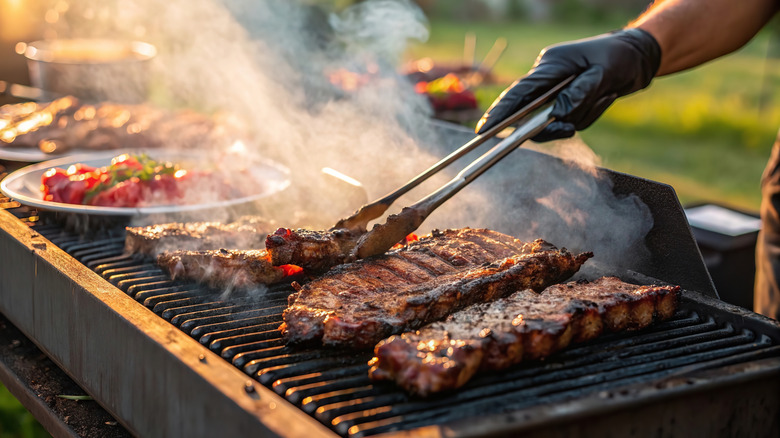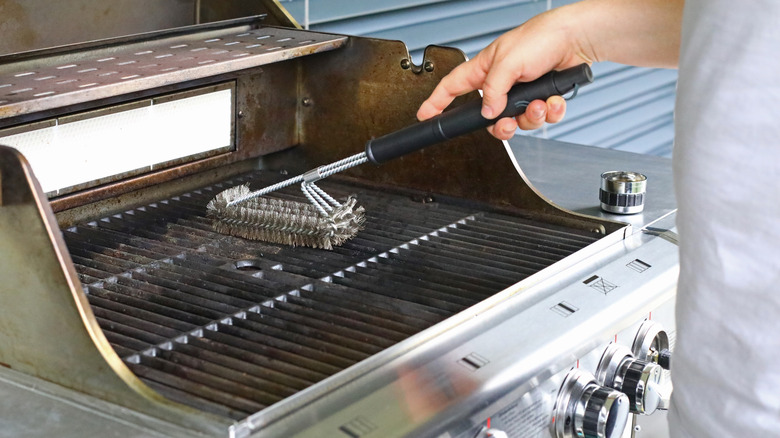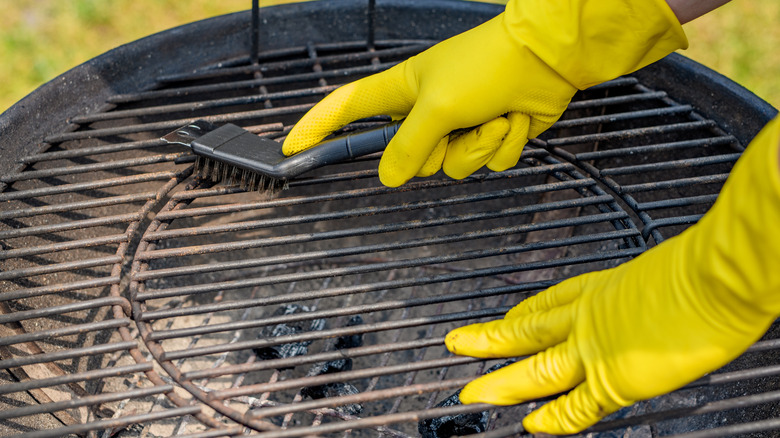Gas Vs Charcoal Grill: Which Is Easier To Clean?
We may receive a commission on purchases made from links.
Gathering with family and friends to grill up your favorite meats and veggies is a fun activity with satisfying results. Unfortunately, barbecuing comes with a not-so-fun, unsatisfying task: cleaning the grill. It's understandable that the amount of work required to keep this item shiny and clean can be a deciding factor when choosing between a gas and charcoal grill. If you're wondering which one is easier to clean, however, the answer isn't as cut and dry as you might think.
Whether you choose a gas or charcoal grill for your barbecuing, the cooking device will require a grate scrub after each use (unfortunately, a dirty barbecue does not mean more flavorful grilled food). This step is essential for preventing the buildup of burnt-on food and grease, which facilitate bacteria growth that can leach into your food. Cleaning away the grime also minimizes flare-ups that can make your food taste unsavory rather than smoky, and it ensures that your food cooks evenly.
A gas grill is generally considered the easier of the two to clean on a regular basis because there are no piles of ash to empty and dispose of as with its charcoal counterpart. In terms of deep cleaning, though, a gas grill has more parts to check and clean, making the process more time-consuming than deep cleaning a charcoal grill. Let's take a look at the cleaning process for each so you can be the judge.
Cleaning a gas grill
Getting your gas grill clean after each use is quick with a grill brush and scraper, like this GRILLART universal cleaning tool on Amazon. If your grill has already cooled, turn it back on for a few minutes to warm up the grates and flavorizer bars, then turn it off before you start cleaning. The heat will loosen the stuck-on grime so you can brush it away easier, and you can use the scraper to get rid of stubborn spots. Then, one of the best ways to keep your grill shiny and clean is to grab a rag or paper towel dipped in vegetable oil (using a pair of tongs) and rub the grates. Don't forget to wipe out the grease trap, which is removable on most gas barbecues.
Keep in mind, though, that you'll also need to remove and soak the grates and flavorizers in warm, soapy water until the crusted-on gunk is soft enough to scrub off. This can take a couple of hours, but one of the most interesting gas grill hacks you need to know is that the natural acids in onions can deep clean the grates.
While the grates soak, brush and scrape the ash, food, and grease residue out of your gas grill's pans and traps, then clean the gas burner tubes (just avoid getting any particles in the openings) and any other interior parts, including the lid. Then, make sure that all of these pieces are completely dry before you reassemble them. Finally, you can clean and dry the grill's exterior.
Cleaning a charcoal grill
Ina Garten's clear favorite in the charcoal versus gas grill debate is charcoal because she likes the flavor. However, one reason some people avoid these grills is that keeping them clean after every use requires some effort. Just like with a gas grill, you should brush and scrape the grates while they're still warm since the food particles and gunk will be easier to remove. The difference, however, is that with a charcoal grill, you also need to scoop out the cooled charcoal and ashes from either the bottom or the ash catcher. To keep the grates cleaner during future use and to protect them against rust, rub the metal slots. It can also be beneficial to clean out the grease trap, but this may only be necessary every third use or so.
Fortunately, deep cleaning a charcoal grill is a little less involved than gas because you don't have to worry about burner tubes. You still need to remove and soak the grates in warm, soapy water, but this should only take about one hour to soften the debris. You can clean the interior and exterior of your charcoal grill — including the grill vent and lid — while you wait. After everything has been scrubbed and rinsed, make sure all the parts are dry before you reassemble them to prevent rusting. If you ever notice excessive corrosion on the grates, you should probably replace them.


